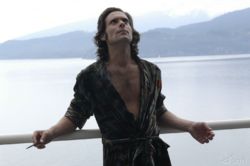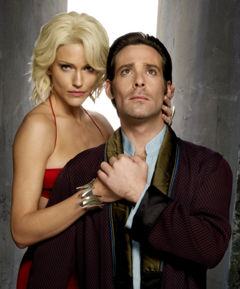God (RDM)
More actions

The humanoid Cylons, as well as a small minority of humans, worship a single deity they call only by the name of God. Cylons justify or attribute much of their actions, including the genocidal attack against humanity, as a requirement of their God. The Cylons profess a series of commandments given by their God. However, the specific commandments have not been fully revealed.
While very knowledgeable of the Lords of Kobol, the Cylons feel that the Colonials worship false gods (Home, Part I)[1].
Several seemingly miraculous events suggest that there may be more to the Cylon God than mere myth. Virtual Six has claimed to be an agent of her deity, and has access to knowledge which seems to belie rational explanation. The healing of Derrick is similarly inexplicable.
The conclusion makes it clear that the being or power the Cylons refer to as God exists and uses "angels", but its nature is unclear and it doesn't care for the name "God" (Daybreak, Part II).
Twelve Colonies
A small minority of monotheistic humans existed on the Twelve Colonies before the Fall. Their religion was illegal in at least some of the Colonies (including Caprica) and most of them were forced to hide their beliefs[2].
| Spoiler follows, click "expand" to read. |
|---|
| Two of them were Zoe Graystone, a closeted monotheist and her boyfriend, Ben Stark, who was more fanatical of the two. Graystone and Stark died in a suicide bombing caused by the latter, but before they died, they managed to upload their memories into online avatars. Zoe Graystone's avatar, Zoe-A, was later uploaded into the first Cylon, created by her father, Daniel Graystone. The fact that the first Cylon had the memories of a human monotheist might have been the cause of the Cylons' belief in one God. |
The Cylon Centurions that participated in the First Cylon War practiced this monotheistic religion. The Final Five Cylons, Samuel Anders, Tory Foster, Ellen Tigh, Saul Tigh, and Galen Tyrol, encountered these Centurions and were encouraged, Ellen in particular, by the possibility that their belief in a single loving God could end the cycle of violence. They adopted monotheism themselves, as opposed to their previous polytheistic beliefs, and are responsible for the belief system of the subsequent humanoid Cylons (No Exit).
First Hybrid
Cylon databases report of a protoype Hybrid which was the result of early experiments in evolution to biological beings. This experiment was considered a failure but believed by some to still be alive. When Kendra Shaw meets this hybrid, he declares that "my children believe I am a god" and he makes a number of statements demonstrating significant and prophetic knowledge. He refers to Kendra as "my child." (Razor).
Baltar
Gaius Baltar, initially sceptical of all religion, is converted to the Cylon faith though the persuasion of his Virtual Six and comes to conclude that he is an agent of God (The Hand of God). Despite this Baltar is far from a model believer and his path of faith is very rocky.
Upon orders from Virtual Six, Baltar instructs his cult, who appear to regard him as a prophet, to follow the "one true God", though it does not seem likely he has explained that this is also the Cylon God.
Notable References
- "Maybe the Cylons are God's retribution for our many sins. What if God decided he made a mistake and he decided to give souls to another creature, like the Cylons?" -- Leoben Conoy, Miniseries, Night 2
- "God didn't create the Cylons. Man did. And I'm pretty sure we didn't include a soul in the programming." -- William Adama, Miniseries
- "I was right. See, our faiths are similar but I look to one God, not to many." -- Leoben Conoy, "Flesh and Bone"
- "To know the face of God is to know madness. I see the universe. I see the patterns. I see the foreshadowing that precedes every moment of every day. It's all there, I see it and you don't." -- Leoben Conoy, "Flesh and Bone"
- "I am more than you could ever imagine. I am God." -- Leoben Conoy, "Flesh and Bone"
- "It's funny, isn't it? We're all God, Starbuck, all of us. I see the love that binds all living things together. ... I know that God loved you more than all other living creatures and you repaid his divine love with sin, with hate, corruption, evil. So then he decided to create the Cylons." -- Leoben Conoy, "Flesh and Bone"
- "And this time, your role...you have to deliver my soul unto God. Do it for me. It's your destiny, and mine." -- Leoben Conoy, "Flesh and Bone"
- "Procreation, it’s one of God’s commandments, be fruitful. We can’t fulfill it we tried so we decided to [create farms]." -- Caprica-Valerii, "The Farm"
Judeo-Christian References

The Re-imagined Series contains few references to Judeo-Christian concepts.
- "Jesus." -- Colonel Tigh, Miniseries (unscripted ad-lib)[3]
- "I was... [Six: Am.] I am..." -- Gaius Baltar, "The Hand of God" (full quote in previous section)
- "Come on, Jim. Wallace Gray is no 'prince of darkness.'" -- Playa Palacios, "Colonial Day"
- "I figured, the devil you know..." -- Laura Roslin, "Colonial Day"
- "God is love" -- Number Six, Miniseries, (1 John 4:16)
The "I am" statement in "The Hand of God" is noteworthy because of the self-description that the Judeo-Christian God gives to Moses in the Book of Exodus, "I am that I am". The Christian messiah, Jesus, has a series of "I am" statements in the New Testament of the Bible. The Bible contains over 300 "I am" statements. The Hebrew name for God, Yahweh, is derived from the Hebrew word for "I am" or "to be".
The five priests of the Temple of Five worshiped a "god whose name must not be spoken." In Jewish tradition, the name of God (Yahweh) is not spoken. In a deleted scene (Kobol's Last Gleaming, Part I), Elosha states that the exodus from Kobol was precipitated when "one jealous god began to desire that he be elevated above all the other gods, and the war on Kobol began." The 1st commandment requires the faithful have no other god before Yahweh.
A number of elements from the show derive from Mormonism, the religion of series creator Glen Larson. In particular, the concept of a lost Thirteenth Tribe is from Mormon legend. The Quorum of Twelve is also a Mormon concept.
A curious parallel to the series is found in the Exodus story of the Old Testament: Moses led the Israelites out of the Egyptian captivity toward the promised land, but did not live to lead the Israelites into the promised land because he doubted the water coming from the stone (Numbers 20:12). This parallels the Pythian prophecy of the leader (presumed to be Laura Roslin) ,who, according to the Sacred Scrolls, will not live to see the promised land of Earth (The Hand of God).
The name of Pergamus Flats (a location on New Caprica) is similar to Pergamus, a city mentioned in Revelation 2:12.
Both the Colonials and the Cylons have had an experience similar to the Jewish exodus from Egypt; the Cylons following the war with the Colonies (including a 40 year period in the wilderness and the slaying of all in the promised land) and the Colonials following their escape from New Caprica.
Official statements
- In an interview with BattlestarGalactica.com on December 28th, 2005 Ron Moore was asked about fan speculation that the Cylon God may be Count Iblis in the Re-imagined Series:
- Q: "There's speculation that Count Iblis' counterpart in this series is the as-yet-unseen Cylon God. Is there any possibility that elements of the original series "War of the Gods" storyline may weave themselves into the new series?
- RDM: While I have thought of incorporating the Count Iblis/Ship of Lights mythology from the original show into the series, I've pretty much decided not to go there for now. The theological construct we've been establishing seems more interesting to me at this point and I don't think Iblis will be part of the current show."
- RDM noted in his podcast of "Kobol's Last Gleaming, Part II", that the original ending of Season One called for actor Dirk Benedict to appear to Baltar on Kobol and introduce himself as "God". Numerous prohibiting factors prevented this storyline from making it on camera, chief among them was Moore's confessed inability to write a feasible conclusion to the surprise revelation at the time. Another mitigating factor which influenced Moore to drop the idea was that when he revealed his idea to the other writers, the entire writing team found the idea simply revolting, so Moore acquiesced.
- In an interview at beliefnet.com Ron Moore made the following statement in response to the question:
- Q: " In “Galactica 1980,” we actually meet the “Imperious Commander” of the Cylons who turns out to be the Devil in the guise of a humanoid. Will we ever meet the maker of the Cylons in this version?
- A: I think if we ever found an answer to why the Cylons have a god or who the god is--you know, the guy steps out from behind the curtain--I think you’d be disappointed. They’re in an interesting place in that their faith is as legitimate as the human faith. Human beings have souls given by the gods, and Cylons have a soul given by their one true god and that has to be just as valid. That means there is a plan for their soul and something for them after they die too. It’s a fundamental element of their faith. "
References
- ↑ Despite the parallelism of the Lords of Kobol with the Olympian Gods of real-world Earth mythology, the parallelisms of the Judeo-Christian God are fewer. In "Occupation", Leoben Conoy prays before a meal, using a prayer that begins with "Heavenly father." When several dying Cylons are found on a baseship, they crawl together and begin a prayer that also includes "Heavenly father." "Heavenly Father" is attested as a chiefly Mormon name for God, similar to the other parallels with the Mormon faith. [1]
- ↑ Caprica casting info (backup available on Archive.org) (in English). (Apr 3, 2008). Note: This information is based on early reports and casting sheets, and thus subject to change.
- ↑ According to RDM, the "Jesus" line was an ad-lib by Michael Hogan. Therefore, it should not be taken as a serious reference to Christianity.
<pagesidebar>
- See Also
- Cylon Religion|Cylon Religion
- Analogues
- Religion in the Twelve Colonies (RDM)#The Lords of Kobol|Colonial Deities and Religion
- Other Series
- God (TOS)|God in the Original Series
</pagesidebar>
